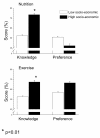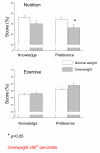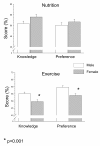Health-related knowledge and preferences in low socio-economic kindergarteners
- PMID: 22233712
- PMCID: PMC3275498
- DOI: 10.1186/1479-5868-9-1
Health-related knowledge and preferences in low socio-economic kindergarteners
Abstract
Objective: The aim of the present study was to determine physical activity (PA) and nutrition knowledge and preferences in low socio-economic status kindergarten children.
Methods: Following height and weight measurement, 795 low socio-economic status kindergarten children (age 3.8-6.8 y.o) completed a photo-pair knowledge and preferences food and exercise questionnaire.
Results: No difference was found between nutrition and PA knowledge scores (52.3 ± 0.9 versus 52.6 ± 0.8%, respectively). There was no difference between the nutrition knowledge and preference score (52.3 ± 0.9 versus 50.9 ± 0.9%, respectively). PA preference was significantly higher than knowledge (56.9 ± 1.5 versus 52.6 ± 0.8%, respectively; p < 0.0001). Significant correlations were found between nutrition knowledge and preferences (r = 0.55, p < 0.0001), physical activity knowledge and preferences (r = 0.46, p < 0.0001), and nutrition and PA preferences (r = 0.46, p < 0.001). Nutrition preference scores were significantly lower in overweight compared to normal weight kindergartners 48.1 ± 1.7 versus 52.0 ± 1.0%; p < 0.05). PA knowledge and preference scores were significantly higher among male compared to the female kindergartners (p < 0.001 for both).
Conclusion: Our data demonstrate diversities in physical activity and nutrition knowledge and preferences among low socio-economic status kindergarten children. These findings may be important for the development of health promotion programs in low socioeconomic kindergarten children.
Figures




Similar articles
-
Validation of an iPad activity to measure preschool children's food and physical activity knowledge and preferences.Int J Behav Nutr Phys Act. 2017 Feb 1;14(1):11. doi: 10.1186/s12966-017-0469-z. Int J Behav Nutr Phys Act. 2017. PMID: 28143528 Free PMC article.
-
Physical activity and nutrition knowledge and preferences in kindergarten children.Int J Sports Med. 2007 Oct;28(10):887-90. doi: 10.1055/s-2007-965001. Epub 2007 May 11. Int J Sports Med. 2007. PMID: 17497596
-
The contribution of three components of nutrition knowledge to socio-economic differences in food purchasing choices.Public Health Nutr. 2014 Aug;17(8):1814-24. doi: 10.1017/S1368980013002036. Epub 2013 Aug 7. Public Health Nutr. 2014. PMID: 23920283 Free PMC article.
-
[Simple obesity in children. A study on the role of nutritional factors].Med Wieku Rozwoj. 2006 Jan-Mar;10(1):3-191. Med Wieku Rozwoj. 2006. PMID: 16733288 Review. Polish.
-
Prevalence of malnutrition among children and women of reproductive age in Uruguay by socio-economic status and educational level.Public Health Nutr. 2020 Aug;23(S1):s101-s107. doi: 10.1017/S1368980020000804. Epub 2020 Apr 17. Public Health Nutr. 2020. PMID: 32299530 Free PMC article. Review.
Cited by
-
Migrant parents' perceptions of the benefits, barriers, and facilitators of young children's physical activity and sedentary behavior: A systematic review of qualitative studies.Obes Rev. 2025 May;26(5):e13889. doi: 10.1111/obr.13889. Epub 2025 Jan 15. Obes Rev. 2025. PMID: 39815686 Free PMC article.
-
Interventions to prevent obesity in children aged 5 to 11 years old.Cochrane Database Syst Rev. 2024 May 20;5(5):CD015328. doi: 10.1002/14651858.CD015328.pub2. Cochrane Database Syst Rev. 2024. PMID: 38763517 Free PMC article.
-
Intrinsic motivation predicts cognitive and functional gains during coordinated specialty care for first-episode schizophrenia.Schizophr Res. 2024 Apr;266:249-255. doi: 10.1016/j.schres.2024.02.037. Epub 2024 Mar 4. Schizophr Res. 2024. PMID: 38442522 Free PMC article.
-
The Tangibility of Personalized 3D-Printed Feedback May Enhance Youths' Physical Activity Awareness, Goal Setting, and Motivation: Intervention Study.J Med Internet Res. 2019 May 31;21(6):e12067. doi: 10.2196/12067. J Med Internet Res. 2019. PMID: 31199322 Free PMC article.
-
Validation of an iPad activity to measure preschool children's food and physical activity knowledge and preferences.Int J Behav Nutr Phys Act. 2017 Feb 1;14(1):11. doi: 10.1186/s12966-017-0469-z. Int J Behav Nutr Phys Act. 2017. PMID: 28143528 Free PMC article.
References
-
- Obesity prevalence among low-income, preschool-aged children - United States, 1998-2008. MMWR Morb Mortal Wkly Rep. 2009;58:769–773. - PubMed
Publication types
MeSH terms
LinkOut - more resources
Full Text Sources
Medical

